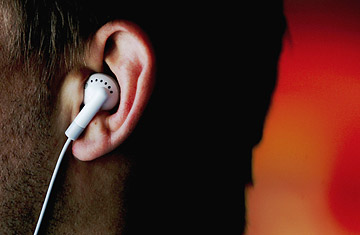How Bad Are iPods for Your Hearing?
Hearing loss is more common than ever before. About 16% of American adults have an impaired ability to hear speech, and more than 30% of Americans over age 20 — an estimated 55 million people — have lost some high-frequency hearing, according to a new study published Monday in the Archives of Internal Medicine. The finding has got experts — and concerned parents — wondering anew: Does listening to loud music through headphones lead to long-term hearing loss? Brian Fligor, director of diagnostic audiology at Children's Hospital Boston, explains how much damage your headphone habit might cause — and how to mitigate your risk.
在现在的社会,听力丧失越来越普遍了。《内科医学文献》周一发表的一份调查研究显示,约16%的美国成年人对日常对话的听力削弱了,近30%的20周岁以上的年轻人,人数大约在55,000,000,已经丧失了对部分高频率声音的听觉。这项发现重新引起了相关人士及专家的担心:长时间通过耳机听大音量的音乐是否会导致人的听力丧失?来自波士顿儿童医院的听力学诊断教授,Brian Fligor解释了耳机听音乐的习惯会给你造成多大的影响,以及如何减轻听力丧失的风险。
Q: How much hearing loss does an iPod cause?
A: It depends on the person, it depends on how long you're listening, and it depends on the level at which you're setting your iPod.

Q:iPod在多大程度上导致了听力丧失?
??
A:那取决于个人,取决于你每次听音乐多长时间,以及你在iPod上设置的音量水平。
If you're using the earbuds that come with an iPod and you turn the volume up to about 90% of maximum and you listen a total of two hours a day, five days a week, our best estimates are that the people who have more sensitive ears will develop a rather significant degree of hearing loss — on the order of 40 decibels (dB). That means the quietest sounds audible are 40 dB loud. Now, this is high-pitched hearing loss, so a person can still hear sounds and understand most speech. The impact is going to be most clearly noted when the background-noise level goes up, when you have to focus on what someone is saying. Then it can really start to impair your ability to communicate.
如果你戴着耳机听iPod,并且将音量设置在90%或以上,每天大约听2小时,一个礼拜有五天,天天如此,我们最好的估计是,谁拥有更敏感的耳朵,谁的听力丧失的程度就更大-以40分贝为准。这意味着最安静的时候, 你能听到40分贝的声音。这是一种对高声调的声音听力丧失,所以她/他仍可以听清楚并且明白大多数的日常对话。这种听力丧失的影响在背景噪音水平上升时表现的最明显,此时你不得不集中注意力才能听清楚某人的讲话。然后,它开始削弱你的社交能力。
This would happen only after about 10 years or so or even more of listening to a personal audio device. One patient I had used his headphones instead of earplugs when he was on his construction job. He thought as long as he could hear his music over the sound of his saws, he was protecting his ears — because he liked the sound of his music but didn't like the sound of the construction noise. He had a good 50 dB to 55 dB of noise-induced hearing loss at 28 years old. We asked a few pointed questions about when he was having difficulty understanding people, and his response was classic. "When I'm sitting at home with the TV off, I can understand just fine," he said, "but when I go out for dinner, I have trouble."
这种情况只会发生在用随身听听音乐10年或者10年以后。我曾经遇到过这样一个病人,他是建筑行业的,当他工作的时候总是戴着耳塞听音乐,他认为只要他听的是音乐声,而不是电锯的噪音,就可以保护他的耳朵——因为他喜欢的是音乐而不是建筑施工时的噪音。在28岁的时候,他已经因噪音诱发了50~55分贝的听力丧失。我们问了一些关键性的问题,关于他在与人交流过程中遇到的困难,他给了一个典型的回答,“当我坐在家里,电视机没有打开的情况下,我可以很好的明白人们的交谈。”他说道,“但是当我去赶赴宴会时,我就会有很大的麻烦。”
There is huge variation in how people are affected by loud sound, however, and this is an area where a number of researchers are conducting studies. Certainly a huge part of this is underlying genetics. We know how much sound causes how much hearing loss based on studies that were conducted in the late '60s and early '70s, before employers were required to protect workers' hearing in noisy work environments. What was found is that when people are exposed to a certain level of noise every day for a certain duration, they're going to have a certain degree of hearing loss on average. But the amount of hearing loss might differ by as much as 30 dB between people who had the toughest ears and those with the most tender ones — a huge variation. Unfortunately, we don't know who has the tougher ears and who has the tender ones until after they've lost their hearing. So, as a clinician, I have to treat everyone as if they had tender ears.
这巨大的变化体现了噪音对人的影响有多大,然而,同时这是一个许多研究者正在努力的方向。当然,这里有很大一部分是属于遗传学的。我们得知的多大程度的声音导致多大程度的听力丧失,是基于六十年代末和七十年代初,雇主尚未被要求在喧嚣的工作环境中保护工人的听力的情况下的研究。我们发现,当人们长期的暴露在某一特定噪音水平环境中,他们平均都会有一定程度的听力丧失。但是,人与人之间听力丧失的程度不同,那些耳朵比较强健的人与耳朵与较柔嫩的人相比,差异可达30分贝。不幸的是,我们直到那些人失去了听力,也还不知道他们谁的耳朵比较强健,谁的比较柔嫩。那么,作为一个临床医师,我必须认真地对待每个人,将他们的耳朵都当做是柔嫩的。












